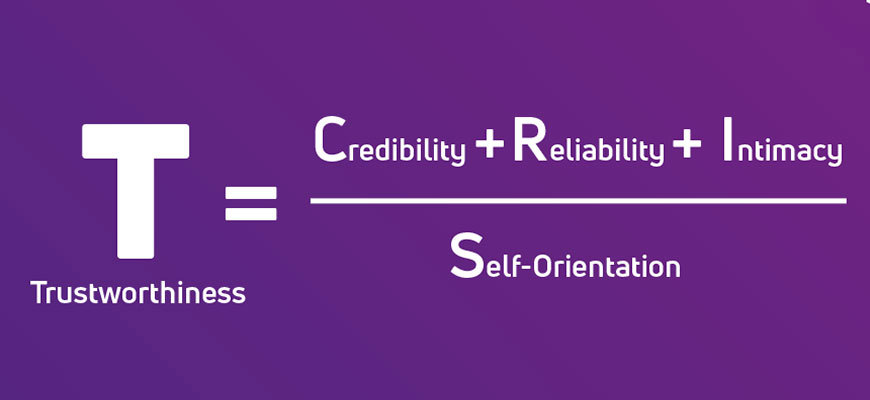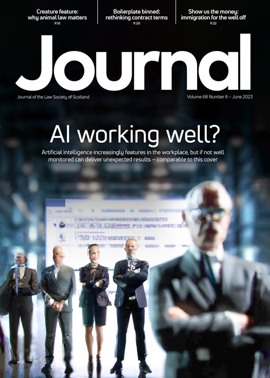The Eternal Optimist: Solving the trust equation

Following my discourse on ChatGPT and AI (artificial intelligence) – Journal, March 2023, 38 – it’s worth examining elements that computers may not fully replace, such as trust and exceptional service. As solicitors, our entire careers are built on trust and reputation. These surely cannot be automated, can they?
Years ago, I watched a talk about the “trust equation” used by Airbnb (the unique business where you might let a complete stranger sleep next door). Since then, I’ve become a believer, noticing how businesses globally incorporate it into their marketing strategies. So, the question arises: can trust truly be automated?
In our profession, it’s common knowledge that we’re not mathematicians. Formulae may drive many to the door, or at least to skip swiftly to the next article. However, for the trust equation (see the diagram), we aim to maximise trust. For this, we need to display high credibility, reliability and intimacy, while keeping self-interest as low as possible. Sounds straightforward, but what does it entail and why does it matter?
What the formula means
Credibility is key. How do we demonstrate our individual or business credibility? Most already do it, showcasing their accolades and publishing insightful blogs and articles. This is why we invest substantial time in preparing submissions for awards and for the Legal 500, and strive for certifications in our fields. When deciding who to trust, clients weigh recognition and evidence of expertise heavily. Even those of us who consider ourselves less proficient can build credibility by writing and blogging. On a personal note, my fascination with ChatGPT has provided me with considerable insights and, I believe, some credibility in the area, despite my not being a programmer or an IP lawyer.
Reliability is a trait all solicitors should possess, but how do we validate that? Testimonials and platforms like TrustPilot are excellent ways to reassure existing and potential clients. How often do you consult Amazon reviews before committing to a purchase? Do you scrutinise LinkedIn profiles to gauge connections or recommendations? Most of us trust individuals or companies more readily if they come recommended by a trusted source. Does a bad review spell disaster?
Not necessarily. A perfect review record to me may appear suspicious, but responding thoughtfully to less-than-stellar feedback can provide context, and demonstrate your commitment to improvement and that you take clients’ views seriously.
Let’s discuss intimacy next. A broad interpretation works best here. It’s about sharing something personal or interesting about yourself or your business. Corporate social responsibility, especially when aligned with charities or causes resonating with our target markets, can boost this factor significantly. Revealing a bit about ourselves on blogs or social media can make us more “interesting”, thus deepening the connection with potential clients. Becoming involved with our local communities, as so many of us do, adds huge value. As I was once told, it’s far more important to volunteer and help at the local barbeque than it is simply to donate a cheque to local groups. One small word of warning: beware of overdoing the intimacy thing. Too much sharing can at times backfire.
Lastly, we need to minimise self-interest. It’s challenging in a profession that charges by the hour (or part thereof), but there are ways. Providing advice in plain English on our websites is a good start, as is guiding clients to cheaper alternatives or even free resources. Ultimately clients may choose to pay us to resolve a matter even where it is less cost effective for them, just as most of us will pay a mechanic to change the oil in our car. Showing clients that we’re here to help them, even when it doesn’t directly benefit us, further enhances trust.
Where does AI come in?
You may be asking what this has to do with AI, trust and service. Once we understand the actions necessary to build trust, they can be automated, and AI is perfectly equipped to do this, often at little or no cost. Automation opportunities are becoming limitless, and often without compromising the client experience. Simple tasks like client feedback forms can be sent automatically at the end of a transaction (or during it?), and likewise automatically updated on your website. AI will provide regular summaries and insights into the feedback, with some suggestions as to improvements, as it will with almost every area of your business. Tailored legal pieces can be automatically sent to clients based on their specific needs and interests. Future research and even writing can be delegated. All of these if implemented well will continue to add trust to your brand.
Changes often take longer than we imagine, but when they arrive they can happen so much faster than we expect. Changes in the field of AI are now weekly, and new iterations are springing up faster than we can follow. Should all of this make us scared, or excited? It doesn’t really matter; the jack is out of the box and the only question now is, do we embrace these opportunities or do we leave it to others?
Perspectives
Features
Briefings
- Criminal court: Dangerous or careless?
- Corporate: Bill gives CMA consumer enforcement powers
- Agriculture: A question for the Land Court?
- Intellectual property: Who owns AI generated copyright?
- Succession: Variation by an attorney?
- Sport: Participation in LIV Golf ruled out of bounds
- Scottish Solicitors' Discipline Tribunal: June 2023
- Data protection: Meta's mega matter
- In-house: Scanning wider horizons







